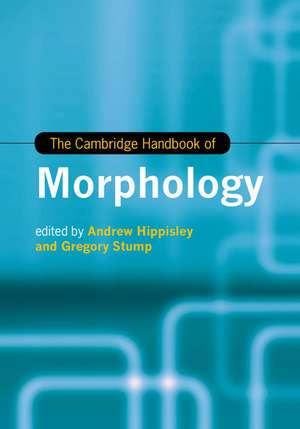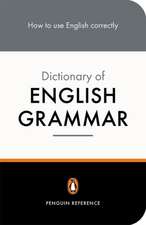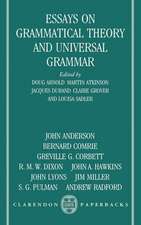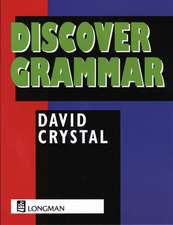The Cambridge Handbook of Morphology: Cambridge Handbooks in Language and Linguistics
Editat de Andrew Hippisley, Gregory Stumpen Limba Engleză Hardback – 23 noi 2016
Din seria Cambridge Handbooks in Language and Linguistics
-
 Preț: 257.36 lei
Preț: 257.36 lei -
 Preț: 419.59 lei
Preț: 419.59 lei -
 Preț: 282.02 lei
Preț: 282.02 lei - 14%
 Preț: 989.27 lei
Preț: 989.27 lei - 23%
 Preț: 982.81 lei
Preț: 982.81 lei -
 Preț: 421.83 lei
Preț: 421.83 lei -
 Preț: 284.81 lei
Preț: 284.81 lei -
 Preț: 338.63 lei
Preț: 338.63 lei -
 Preț: 297.50 lei
Preț: 297.50 lei -
 Preț: 280.50 lei
Preț: 280.50 lei -
 Preț: 285.18 lei
Preț: 285.18 lei -
 Preț: 284.94 lei
Preț: 284.94 lei -
 Preț: 281.54 lei
Preț: 281.54 lei -
 Preț: 280.68 lei
Preț: 280.68 lei - 19%
 Preț: 495.90 lei
Preț: 495.90 lei -
 Preț: 417.90 lei
Preț: 417.90 lei - 14%
 Preț: 880.33 lei
Preț: 880.33 lei -
 Preț: 419.23 lei
Preț: 419.23 lei -
 Preț: 315.15 lei
Preț: 315.15 lei - 23%
 Preț: 977.84 lei
Preț: 977.84 lei - 23%
 Preț: 1493.38 lei
Preț: 1493.38 lei -
 Preț: 419.93 lei
Preț: 419.93 lei - 19%
 Preț: 451.06 lei
Preț: 451.06 lei - 23%
 Preț: 949.77 lei
Preț: 949.77 lei - 23%
 Preț: 1066.00 lei
Preț: 1066.00 lei - 14%
 Preț: 989.06 lei
Preț: 989.06 lei -
 Preț: 347.32 lei
Preț: 347.32 lei -
 Preț: 370.92 lei
Preț: 370.92 lei - 23%
 Preț: 1075.01 lei
Preț: 1075.01 lei - 23%
 Preț: 1023.97 lei
Preț: 1023.97 lei - 11%
 Preț: 507.18 lei
Preț: 507.18 lei - 23%
 Preț: 753.13 lei
Preț: 753.13 lei -
 Preț: 473.75 lei
Preț: 473.75 lei -
 Preț: 468.73 lei
Preț: 468.73 lei - 23%
 Preț: 1027.19 lei
Preț: 1027.19 lei -
 Preț: 398.99 lei
Preț: 398.99 lei -
 Preț: 398.39 lei
Preț: 398.39 lei
Preț: 1106.25 lei
Preț vechi: 1436.68 lei
-23% Nou
Puncte Express: 1659
Preț estimativ în valută:
211.71€ • 220.21$ • 174.78£
211.71€ • 220.21$ • 174.78£
Carte tipărită la comandă
Livrare economică 15-29 aprilie
Preluare comenzi: 021 569.72.76
Specificații
ISBN-13: 9781107038271
ISBN-10: 1107038278
Pagini: 878
Ilustrații: 19 b/w illus.
Dimensiuni: 182 x 255 x 42 mm
Greutate: 1.85 kg
Editura: Cambridge University Press
Colecția Cambridge University Press
Seria Cambridge Handbooks in Language and Linguistics
Locul publicării:New York, United States
ISBN-10: 1107038278
Pagini: 878
Ilustrații: 19 b/w illus.
Dimensiuni: 182 x 255 x 42 mm
Greutate: 1.85 kg
Editura: Cambridge University Press
Colecția Cambridge University Press
Seria Cambridge Handbooks in Language and Linguistics
Locul publicării:New York, United States
Cuprins
1. Introduction Andrew Hippisley and Gregory Stump; Part I. Foundations of Morphological Theory: 2. Two morphologies or one? Inflection versus word-formation Andrew Spencer; 3. The minimal sign: morpheme or lexeme James Blevins; 4. Productivity Georgette Dal and Fiammetta Namer; Part II. Issues in Morphological Theory: 5. Alternations: stems and allomorphy Mary Paster; 6. Morphological semantics Paolo Acquaviva; 7. Affix ordering: motivation and interpretation Marianne Mithun; 8. The place of morphology Mark Aronoff; 9. The status of paradigms Gilles Boyé and Gauvain Schalchli; Part III. Morphological Principles: 10. Lexicalism, the principles of morphology-free syntax and syntax-free morphology Paul O'Neill; 11. Defaults and overrides in morphological description Dunstan Brown; 12. Implicative relations in word-based morphological systems Farrell Ackerman and Rob Malouf; Part IV. Morphological Frameworks: 13. Classical morphemics: assumptions, extensions and alternatives Laurie Bauer; 14. Natural morphology Wolfgang U. Dressler and Marianne Kilani-Schoch; 15. Distributed morphology Martha McGinnis-Archibald; 16. Construction morphology Geert Booij; 17. Paradigm function morphology Olivier Bonami and Gregory Stump; 18. Network morphology Andrew Hippisley; Part V. The Role of Morphology in Theories of Phonology and Syntax: 19. The role of morphology in generative phonology, autosegmental phonology and prosodic morphology Sharon Inkelas; 20. The role of morphology in optimality theory Zheng Xu; 21. The role of morphology in transformational grammar and its descendants Stephen Anderson; 22. The role of morphology in constraint-based lexical grammars Olivier Bonami and Berthold Crysmann; 23. The role of morphology in dependency grammar Richard Hudson; Part VI. Domains for the Evaluation of Morphological Theories: 24. Frequency and corpora Péter Rácz, Viktória Papp and Jennifer Hay; 25. Morphology in linguistic typology Johanna Nichols; 26. Morphology in language change Brian Joseph; 27. Morphology and language acquisition Constantine Lignos and Charles Yang; 28. Experimental morphology Harald Clahsen; 29. Computational morphology Lynne Cahill.
Recenzii
'Wide-ranging and comprehensive, this volume is a welcome addition to the reference volumes currently available in the field of linguistic morphology. Covering everything from general theoretical issues, contemporary frameworks, and interfaces with phonology and syntax to computational, experimental, and psycholinguistic approaches, it will be a valuable resource to linguists and scholars in related fields.' Rochelle Lieber, University of New Hampshire
'A fine wide-ranging overview, carefully planned and well executed. It is packed with analysis and insight, demonstrating the substantial progress that morphologists have made over recent years. This timely book will be invaluable not only to morphologists, but also to syntacticians and phonologists.' Greville G. Corbett, Surrey Morphology Group
'The Cambridge Handbook of Morphology provides a rich and up-to-date compendium of the problems that morphology poses for descriptive and theoretical linguistics, and of the ways in which linguists have tried to approach those problems; the volume will be invaluable to morphologists as a definition of the state of the art, and to other linguists interested in entering or keeping up with this field.' Bernard Comrie, University of California, Santa Barbara
'A fine wide-ranging overview, carefully planned and well executed. It is packed with analysis and insight, demonstrating the substantial progress that morphologists have made over recent years. This timely book will be invaluable not only to morphologists, but also to syntacticians and phonologists.' Greville G. Corbett, Surrey Morphology Group
'The Cambridge Handbook of Morphology provides a rich and up-to-date compendium of the problems that morphology poses for descriptive and theoretical linguistics, and of the ways in which linguists have tried to approach those problems; the volume will be invaluable to morphologists as a definition of the state of the art, and to other linguists interested in entering or keeping up with this field.' Bernard Comrie, University of California, Santa Barbara
Descriere
This book examines the diversity of both the morphological phenomena and the methodologies and theoretical frameworks by which their properties are investigated.













